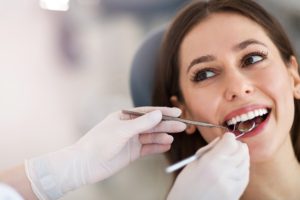
In our Shelby Township dental office, our goal is to help people prevent problems from occurring in the first place. With regular dental check-ups, adhering to individualized at-home instructions, and having recommended treatment (such as crowns to protect teeth with fractures or using a specific toothbrush for more-effective plaque removal), patients can save greatly in treatment time and costs for repairs. 
We strive to help our patients enjoy healthy, confident smiles at every stage of life. We know that no one wants to spend time having a cavity repaired or undergoing treatment for gum disease. And, while those 6-month check-ups help to provide you with a clean slate, of sorts, between visits, an important part of these visits include oral cancer screenings.
Cancer?
Yes! During your dental examinations, we are looking for suspicious signs of oral cancer. Generally, it goes rather quickly so you may not realize it has occurred. However, we look under the tongue, inside the cheeks, on the lips, and roof of the mouth for concerning spots and lumps.
April is designated as National Oral Cancer Awareness Month. Yet, everyday should be a day to watch for signs and symptoms of oral cancer. Oral cancer takes the life of one American every hour and has one of the worst survival rates of all cancers. For those diagnosed with the disease, half do not survive more than 5 years.
The high death rate is blamed largely on oral cancer being discovered after development is advanced. Although most dentists perform an oral cancer screening during routine examinations, a 2013 Gallup Poll revealed an estimated one-third of Americans do not visit a dental at least once a year. (https://www.colgate.com/en-us/oral-health/basics/dental-visits/ada-04-one-third-of-americans-skipped-the-dentist-in-the-past-year)
Although we need to get people in the dental office in the first place, too many are unfamiliar with its signs and symptoms. As a rule of thumb, any unusual spot inside the mouth (including on or under the tongue or inside the cheeks) or lips that does not heal within 2 weeks should be promptly examined by a dentist or dental specialist.
Yet, not all symptoms of oral cancer can be seen. There are some that may “feel” different to the patient that should be communicated to us during your exams. For those that emerge, waiting until your next 6-month check up is too risky.
It is important that adults are aware of the signs and symptoms of oral cancer so they can respond promptly. These include:
In addition to prompt measures for suspicious signs and symptoms of oral cancer, it is also wise to know if you fall into a higher-risk category. Factors that can increase the risk of oral cancer include:
Unfortunately, getting the word OUT and getting patients IN a dental chair remain a challenge. One reason may be because oral cancer has failed to garner the publicity of other cancers such as cancer of the breast, colon, and prostrate (of which regular screenings are taken rather seriously).
Yet, for a few celebrities who have chosen to share their battles with oral cancer, the eventual outcomes are often dire. With social media and greater access to visual realities, the gloomy statistics surrounding oral cancer are gradually moving to the forefront.
Movie critic Roger Ebert valiantly shared his oral cancer battle through Facebook. His story, and ultimate death in 2013, was then shared in a documentary, “Life Itself,” that chronicled his journey, complete with its difficult and disfiguring treatment and the challenges for loved ones. Watching this, viewers should hopefully think of their dental check-ups in a different way.
For suspicious areas in the mouth, we may recommend a biopsy. This can provide us with more information so we can advise the patient on immediate steps to take. Fortunately, most areas are benign. However, early treatment can minimize the requirements needed to fully address the problem so you can resume a normal life.
Remember, dental check-ups and cleanings are important to your overall health and well-being. The oral bacteria of gum disease has been shown to trigger some serious problems far beyond the mouth. It has been linked to heart disease, stroke, Alzheimer’s disease, preterm babies, and erectile dysfunction (ED).
Be committed to your six-month dental exams and cleanings. Your smile will benefit as well as your overall health! Call 586-739-2155 to schedule or tap here to begin.